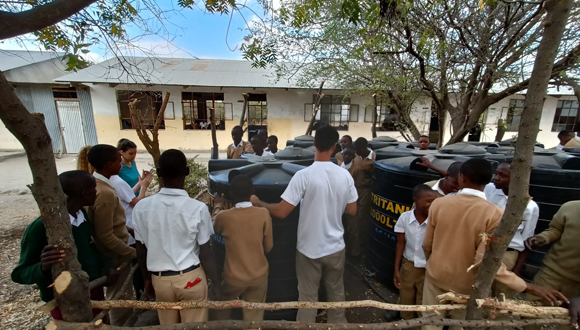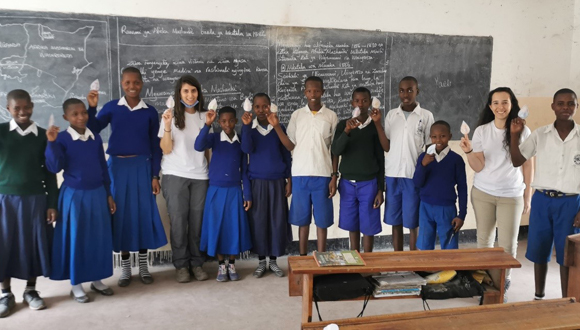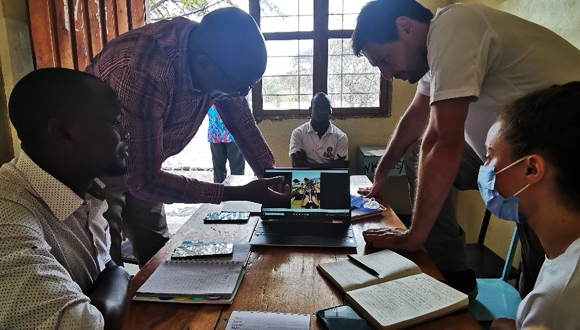Six TAU students who volunteer with Engineers Without Borders tell us about their project in Tanzania, where they are working to provide clean drinking water for local communities.
TAU students Yaeli Benovich, Shir Halevi, Sharon Berkovich, Dvir Ginzburg, Offir Inbar and Shir Aviram volunteer with the Engineers Without Borders – Tel Aviv (EWB-TA) chapter, and recently returned to Israel after a three-week delegation to Tanzania. The EWB team has been working for eight years at the Babati district in northern Tanzania, helping the locals develop sustainable solutions for making drinking water accessible to the local communities.
The students have installed unique low-cost rainwater harvesting systems in eight regional schools. The systems purify and conserve rain water during dry seasons and provide drinking water for thousands of students annually. During the recent trip, the group returned to two elementary schools and one high school to do maintenance and upgrades on existing systems. They also met with local authorities to discuss further development and expansion plans.
– How did this specific project within the EWB organization come into existence?
“The Tanzania project started after an Israeli traveler was exposed to the medical problems and daily difficulties facing children and residents in the villages. In the Northern part of Tanzania, drinking water is scarce, and, when found, contains an extremely high concentration of fluoride. High fluoride concentration in drinking water causes severe medical issues, especially in children, such as skeletal deformities, dental problems, and more,” explains Dvir, a PhD student from Tel Aviv University’s Faculty of Egineering and a long-time program volunteer.
– What solution(s) did you come up with?
“We developed a unique low-tech rainwater harvesting system that can be easily installed and implemented in regional schools, providing clean drinking water for more than 3,000 children. The solution is simple and sustainable. With proper use, the school’s roof can store enough water to meet the needs of the children and staff throughout the dry season. Filters and chlorine tablets ensure that the children drink clean water,” shares Dvir.
The EWB team also partnered with the local Arusha Technical College engineering department to perform quarterly water quality testing and maintenance of the systems. During the last visit, the team returned to the College to discuss current collaborations, the College’s projects and further cooperation and directions for joint research.
In addition to developing the water purification systems, EWB students put a lot of effort into educating schoolchildren about the importance of consuming clean water. “We come to the schools and build the systems together with teachers and students. Our vision is that the principal and staff will be responsible for maintaining the system. For this purpose, we have written a system manual in English and Swahili and performed technical training for the staff,” says Sharon, a BSc student of TAU’s Faculty of Exact Sciences and Faculty of Engineering.

The team builds the water systems together with the schools’ staff and students
The group also presented the schoolchildren with a colorful book that explains the importance of clean water and shows how to maintain the installed water systems. The students wrote the book themselves and had it translated into Swahili. At each school they visited, the team presented the teachers with the book, and organized an educational activity with the children, reading together and discussing the importance of clean drinking water in the tanks.

The team teaches local students about the importance of drinking clean water
What’s Next?
The team held dozens of meetings with village leaders, district heads, local water authorities and members of the parliament. “We want to cooperate with the water authorities to reach the areas with the most significant water challenges. The water engineers have told us which areas lack large water projects. We hope that we’ll have the resources and that’s where we’ll be heading next,” says Sharon.
“We’re determined to expand our activity, and are already preparing our next journey. Our recent trip to Tanzania highlighted the great impact that our projects have for the locals. In our upcoming delegation, we’ll upgrade the water systems in selected areas and execute additional projects in other areas where people are suffering from a lack of access to clean water,” concludes Dvir.
The students have warm feelings about the country and its people: “We feel at home in Tanzania. Over the past few years, we have built close friendships with the community. We stay in touch via phone calls and messages, even when we’re back in Israel,” says Sharon with a smile.

Meeting with the directors of the water authorities
Companies and people interested in contributing and partnering with the project are invited to contact the team: ewb.il.tanzania@gmail.com
Website: www.ewbta.com
LinkedIn: www.linkedin.com/company/afria-engineers-without-borders-tel-aviv
Featured image: Dr. Musa Chacha, Rector of Arusha Technical College, visits the water projects
